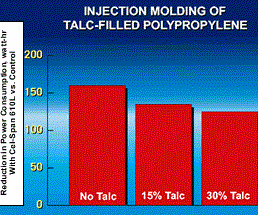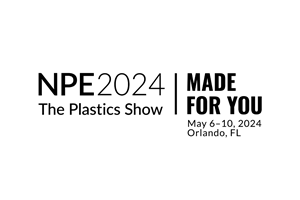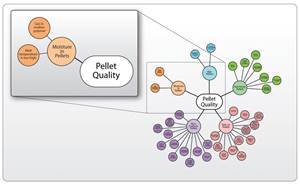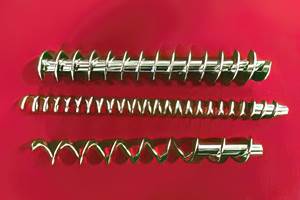Novel Processing Aids Ease Flow Of a Wide Range of Plastics
A new family of processing-aid masterbatches is said to enhance the processability of a wider range of plastics than is possible with other additives.
A new family of processing-aid masterbatches is said to enhance the processability of a wider range of plastics than is possible with other additives. Based on unique chemistry (patent pending), these products reportedly provide dramatic improvements in injection molding cycle times and extrusion rates.
Sold under the Cell-Span name, they are produced by Phoenix Plastics of Conroe, Texas, a custom compounder and supplier of specialty additive masterbatches. Cell-Span was developed in concert with Stabilization Technologies, a consulting firm in Charlotte, N.C., headed by Joseph R. Webster, a well-known expert in additives chemistry for plastics and fibers.
Significant cost savings
Seven Cell-Span formulations, all sharing a similar base chemistry, are tailored for use in various plastics ranging from polyolefins, PS, and PVC to ABS, PC, PET, PBT, and nylons. Says Webster, "We have found a new home for existing chemistries not typically used in plastics. These "supramolecular" chemistries allow formation of directional hydrogen bonds that emulate the stronger covalent bonds."
According to Webster, these additive masterbatches can replace existing processing aids and lubricants, such as metallic stearates, amides, and fatty acid derivatives used in polyolefins and the styrenics and waxes used in PVC. Cell-Span can also replace some primary and secondary antioxidants and nucleating agents, according to Webster.
The new additives are said to be very cost-competitive and have been shown in extensive field tests to provide significant cost savings. The masterbatches contain 20% active ingredient and are used at typical letdown levels of 0.2% to 1%, compared with 1% to 3% for many conventional additives.
- HDPE: In one trial, use of Cell-Span 610 in molding 2-lb, green-pigmented HDPE pails cut cycle time by 5 sec, a 25% reduction. Part cost was reduced from $1.52 to $1.45, a savings of $2509.44 per month after accounting for the cost of the additive..
- Unfilled PP homopolymer: Cell-Span 610L in a 61-g, pigmented PP part resulted in a 10-sec drop in cycle time—a 36% reduction—and cost savings of $4166.77 per month.
- Talc-filled PP homopolymer: The addition of 610L to a 3-lb, 30% talc-filled part molded on a 750-ton machine reduced cycle time from 83 to 52 sec, or 37% (see graph). Cycle time for a 15% talc-filled part went from 76 sec to 52 sec (-31%).
- PP random copolymer: Cell-Span 610 in a 1.2-lb pigmented part reduced cycle time by 13 sec, or 17%, at a monthly cost saving of $700.
- 30% glass-filled PP: Cell-Span 610L reduced cycle time 36% to 80 sec, saving the molder $1,026/day and $30,805/month.
- Foamed PP: Unfilled, pigmented PP experienced sink marks, despite the use of an endothermic blowing agent. By adding 610L, flow was increased and sinks disappeared (see photo).
- Flexible PVC: Cell-Span 605 in a molded flexible PVC part allowed processing temperature to be reduced from 320-330 F to 230-250 F, and cycle time was 6 sec shorter.
- Rigid PVC: Cell-Span 608 in a rigid PVC extruded profile reduced extruder load from 52 amps at 18 rpm and 305-365 F down to 39A at 26 rpm and 205-300 F. This upped the output rate 63% to 538 lb/hr from 330 lb/hr.
- PS: Grade 610 in a 1.5-lb pigmented part reduced cycle time by 25 sec, or 45%, thereby saving $6922/mo.
- ABS: Cell-Span 610L in a 2.5-lb pigmented part reduced cycle time by 16 sec, or 23%, on a 500-ton molding machine, partly by allowing the hot runner’s temperature to be cut from 490 F to 450 F.
- Addition of Celspan 610L to ABS on a 750-ton injection press allowed a 10-sec, or 17%, reduction in cycle time for a 2.5-lb part in a six-cavity mold.
- Polycarbonate: Grade 606 in a 1.3-lb, pigmented part resulted in a cycle-time reduction of 23 sec, or 30%. This translated into monthly savings of $3752 and lowered the piece price 10%.
- Nylons: Various grades of Cell-Span in injection molded nylon 6, 66, and other nylons have allowed molding temperatures to be reduced by 18° to 45° F while reducing cycle times by 20 to 35 sec in both natural and glass-filled systems.
Related Content
Sirmax Adapts Integrated Recycling Approach to US Supply Conditions
Integrating compounding and recycling to leverage untapped postindustrial recycling feedstocks.
Read MoreProcessing Megatrends Drive New Product Developments at NPE2024
It’s all about sustainability and the circular economy, and it will be on display in Orlando across all the major processes. But there will be plenty to see in automation, AI and machine learning as well.
Read MoreThe Path to Pellet Perfection
In underwater pelletizing, numerous variables in the equipment, process and material affect pellet shape, consistency and quality factors such as fines. Defining the “perfect” pellet depends on the conditions of end use, and achieving that ideal requires understanding of the causes of imperfections.
Read MoreWhat to Know About Your Materials When Choosing a Feeder
Feeder performance is crucial to operating extrusion and compounding lines. And consistent, reliable feeding depends in large part on selecting a feeder compatible with the materials and additives you intend to process. Follow these tips to analyze your feeder requirements.
Read MoreRead Next
See Recyclers Close the Loop on Trade Show Production Scrap at NPE2024
A collaboration between show organizer PLASTICS, recycler CPR and size reduction experts WEIMA and Conair recovered and recycled all production scrap at NPE2024.
Read MorePeople 4.0 – How to Get Buy-In from Your Staff for Industry 4.0 Systems
Implementing a production monitoring system as the foundation of a ‘smart factory’ is about integrating people with new technology as much as it is about integrating machines and computers. Here are tips from a company that has gone through the process.
Read MoreLead the Conversation, Change the Conversation
Coverage of single-use plastics can be both misleading and demoralizing. Here are 10 tips for changing the perception of the plastics industry at your company and in your community.
Read More



.%20Addition%20of%20Cell-Span%20in%20the%20hopper%20increased%20flow%20and%20eliminated%20sinks.jpg;width=700;quality=80)



















